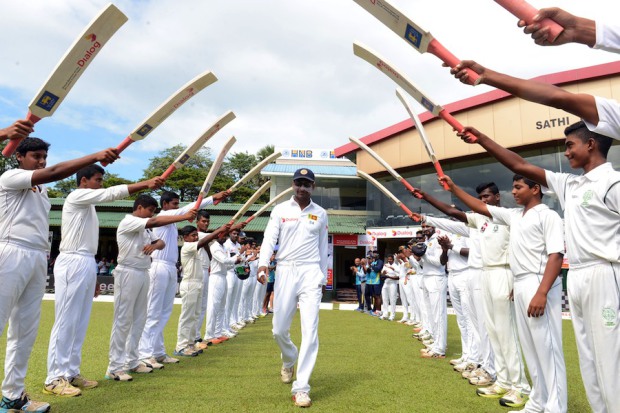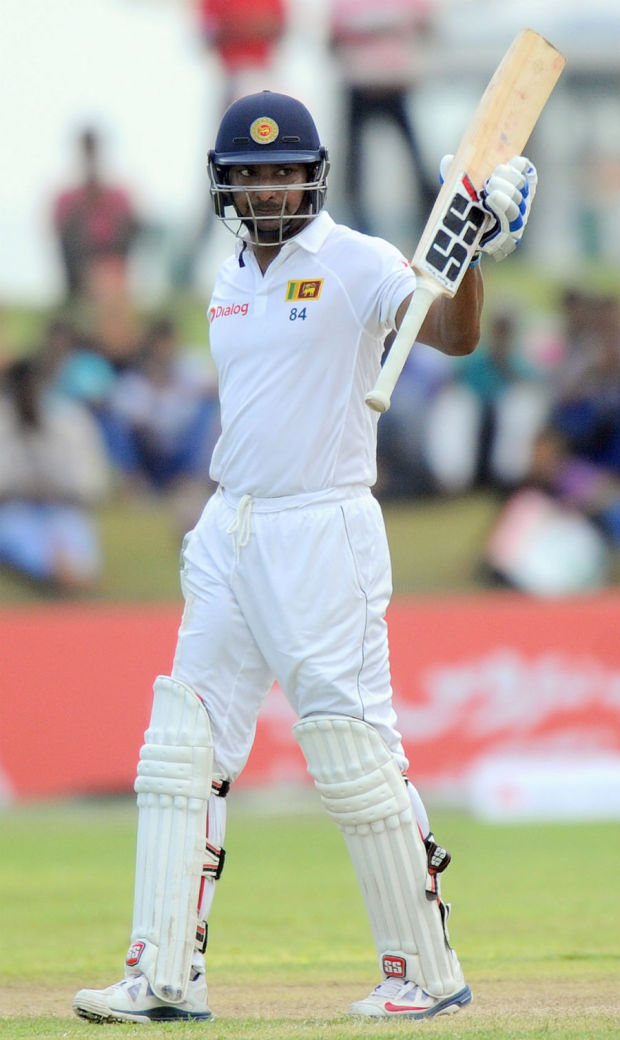In perspective - even the obsession
Paul Farbrace

|
|||
|
Related Links
Players/Officials:
Kumar Sangakkara
Teams:
Sri Lanka
|
|||
"What do you think? How's it looking?" It was another practice session at the Premadasa Stadium in Colombo, and Kumar Sangakkara was as inquisitive and conscientious as ever. And very precise. He wanted his back foot to move from middle and leg to middle and off. Not forward or back - just a fraction across, which allowed his shoulders and hips to align when facing right-arm seamers.
I was in the first of two coaching stints with Sri Lanka, as an assistant to Trevor Bayliss (a few years later I would return as head coach), and was doing my best to keep on top of the session. But I could see Sanga was hitting the ball nicely. "Brilliant," I told him. "No problems whatsoever."
He was unimpressed with my forensic analysis. "The first ten balls I faced, I moved my back foot in four or five different ways," he said. "If I ever ask you again, tell me the truth or don't tell me anything." It was a big lesson for me as a coach. And it told me plenty about Kumar Sangakkara.
When I first arrived in the Sri Lankan dressing-room, in July 2007, he wasn't yet the main man, although he had just taken a pair of unbeaten double- hundreds off Bangladesh. Instead, he was one of the Big Five, along with Sanath Jayasuriya, Muttiah Muralitharan, Chaminda Vaas and Mahela Jayawardene. You could see his qualities, and you knew he was going to be a driving force. His strength was enhanced by his great friendship with Mahela, and the team benefited from their different qualities. Mahela was instinctive, competitive, a real winner. Sanga was more organised and methodical, and would watch endless videos. But they were both patriots who felt they were representing the country, not just their team-mates.
One of Sanga's first deeds after I arrived was to make 192 at Hobart after Australia had set us 507. We made 410, and Sanga was given out by Rudi Koertzen, caught at slip off shoulder and helmet: a stinker. That night we were in the hotel bar when the umpires walked in. There was a pause, then Sanga stepped forward: "Rudi! What can I get you to drink?"
If that was typical of him, so was the way in which he used that innings to get even better. Over a year later - by which stage he already had more than 6,000 Test runs - we were in the indoor school at Colombo's SSC. Sanga couldn't quite get his movements right, so he asked our analyst to access footage of the Hobart innings. He wanted to check the movement of his left foot in relation to Brett Lee's delivery stride. Once he'd absorbed the information he needed, he was ready to bat again.
Nothing distracted him from his practice. There were times when, frankly, this made him a pain in the backside. Net sessions had to be just so. You'd think they were over, then he'd march back in for a few more throwdowns. They could last anything from 20 minutes to an hour. When he was wearing his game head, there was a selfishness about him. But no one minded, because that selfishness was usually for the greater good.
Every coach who worked with him knew you ended up needing reconstructive shoulder surgery. And your throwdowns had to be accurate. I was giving him a few at Sydney, and in the previous game he'd missed a couple of square-drives, so I thought I'd throw one or two a little wider. He left the first alone, and just looked at me. When I did the same again a few balls later, he stared back, then walked straight past me and into the dressing-room. We never mentioned it again, but I got the message.
People usually think of his amazing Test record, but it's easy to forget what a top-class limited-overs player he became. When I returned to the Sri Lankan set-up at the end of 2013, his one-day game had gone to another level - not that he was exactly struggling. Back in 2008, there was a debate about where he should bat in the Asia Cup in Pakistan. Trevor wanted him to open, because the new ball wasn't going to do much, but others were worried about him nicking off early. Trevor won: Sanga opened and made three hundreds, and Sri Lanka lifted the trophy.

|
|||
He soon established his niche at No. 3, and the hundred he made against England at Wellington in the 2015 World Cup was probably the best one-day innings I saw him play. Though I had moved to the England team by then, I told him so as he came off the field. Once he got to 20, I just slumped back in my chair. Unless he was going to run himself out, I couldn't see how he was going to lose his wicket.
Because he was such a structured, thoughtful player, there was sometimes a perception that one-day cricket didn't suit him. It's true that he didn't have the flair of Jayasuriya or Jayawardene, or the improvisational skills of Tillekeratne Dilshan. But he showed you could bat normally and still score big hundreds. He was never very good at slogging, yet the way he came down the track to spin, and hit over straight extra cover or straight midwicket - there weren't many in the world who could do that.
Across the formats, I'd say the greatest innings he played during my time with Sri Lanka came in the final of the World Twenty20 against India in 2014. Sanga hadn't scored many runs leading up to it, and felt he owed the team. No one needed to tell him that. There was a short discussion about whether he should play or not, but I was adamant I wanted him in.
Both he and Mahela had ruffled a few feathers at Sri Lanka Cricket by announcing they would be retiring from Twenty20s at the end of the tournament, and we played on the news a bit: do it for Sanga and Mahela, that kind of thing. In our team meeting before the final against India, our analyst asked if he could play a video I looked around he'd put together. It was a corny montage of the two of and all the players them smiling, laughing, walking off the field arm in arm, all put to music. At the end of it, I turned to our were drying manager Michael de Zoysa to ask if he wanted to say his customary few words, and he just made this sniffing noise. I looked around and all the players were drying their eyes. No one said another word. All you could hear was the scraping of chairs as they all got up and quietly embraced Sanga and Mahela.
He then went out and made an unbeaten 52 off 35 balls to take us home with a couple of overs to spare. It wasn't a pretty innings, but it was effective, and the emotion at the end of it was something else. The most impressive part was that, though he was out of nick, he found a way. Given the significance of the game, and all the finals Sri Lanka had lost in previous years, it was a terrific display of temperament.
Despite being an outsider, I was always made to feel welcome. The number of dinners he and Mahela paid for got a bit embarrassing, but that's the Sri Lankan way. I remember how well they looked after some of the Yorkshire lads when they were on a training camp in Sri Lanka. His wife, Yehali, cooked dinner one night and a few of us were invited over. He and Andrew Gale, whom he'd never met before, spent two hours talking about being left-handers - how to hit over the top, how to deal with the rough and the swinging ball and different angles of attack. At one point, they disappeared down the corridor, swapping tips about when to pick your hands up when you come down the wicket. Sanga won't thank me for saying this, but he's a proper cricket badger.
He put his considerable brain to good use, though it was better if you weren't on the receiving end. If he was ever in danger of losing an argument (which I believe is yet to happen), he would adopt one of two tactics: speak more loudly, or use words you'd never heard of. He would dazzle you into submission. No wonder he once trained to be a lawyer.
His best sledge was aimed at Nasser Hussain in Sri Lanka in 2003-04, when England were playing in Kandy. Nasser had called Murali - the hometown hero - various names, so the locals weren't best pleased. And it's fair to say Nasser was a bit grumpy with his own team-mates too. When he came in to bat, Sanga piped up with: "What's it like to be hated by both teams?" It wasn't abusive, but he knew how to get under your skin. I cracked a few times, and he had this way of talking about me in the team bus, especially to Murali, who shared his sarcastic sense of humour. "Hey, Murali," he'd say. "Our fat coach - do you think he's got any fatter?"
When I left Sri Lanka to join England in 2014, I wasn't very comfortable about the fact that my first series was against my old team. A few people had accused me of leaving for the money, which was never the case, but Sanga broke the ice ahead of the opening international of the tour, a Twenty20 match at The Oval. As I was walking up the steps to the pavilion, he was at the top. There were quite a few journalists waiting around, and he shouted down: "Traitor! Traitor's here. Don't talk to him, boys." All the way through the series, we would shake hands after every game, and he would pull me in and, with a twinkle in his eye, say: "Traitor." He made it easy for me.
Maybe the best thing about him is that he had life in perspective. Nothing was too much trouble, and he always stayed humble. One afternoon, after he'd kindly driven me to a local hospital because of an ear infection, we stopped off to pick up his dad, then drove to a nearby ground. For 20 minutes, his dad threw some balls at him on a concrete strip, just to make sure all the basics were working correctly. Sanga obviously held him in high regard. And I'll never forget how he helped keep spirits up after the terrorist attack in Lahore in 2009. He and I were among the four who were at the front of the bus on the left and got hit by shrapnel, and we all spent a few days together in hospital back in Colombo. One afternoon, we had some important visitors - the leaders of the opposition in parliament. I could hear Sanga coming down the corridor shouting: "Fat coach, fat coach! Where are you?" Then he entered the room, saw who was there, and suddenly changed tack: "Ah, sir, very good to see you! Thank you for coming!" That was Sanga to a T: he was mischievous, quick-witted and charming, and everyone loved him for it. Sri Lankan cricket will miss him like mad.

